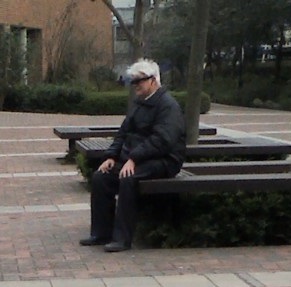
- Can you see with
your ears?
"How well do you see what you hear?" Our new paper
in Frontiers
in Psychology (with Alastair Haigh, Dave Brown,
and The vOICe inventor Peter Meijer) is now published, and
receiving media attention with interviews on BBC Radio
Bristol (pre-recorded piece at ~22.10 to 23.55, live
interview starts at ~2:09.00) and BBC Radio 5
Live (starts at ~24.50), and in print.
- BBC One segment on
our research for The One Show
- 15 May 2013
 Peter White trying The vOICe
Peter White trying The vOICe
Peter White, MBE, is
a BBC presenter who has been blind since birth. He spent a day
with Michael Proulx and Dave Brown to talk about sensory
substitution devices for the visually impaired, and what such
research is revealing about the neural and psychological basis for
perception. He also spent a few hours learning to use The vOICe. The segment
aired on The One Show, and Peter White also appeared live on the
show to discuss his experience! It is available for viewing on the
BBC iPlayer
(starting around 28:30).
For more information on our research related to this segment,
please see our following papers on the topics of sensory
substitution and blindness:
- Proulx, M. J., Brown, D. J., Pasqualotto, A., & Meijer, P.
(in press). Multisensory
perceptual learning and sensory substitution. Neuroscience
& Biobehavioral Reviews. (special issue)
- Haigh, A., Brown, D., Meijer, P., & Proulx, M. J. (2013).
How
well do you see what you hear? The acuity of
visual-to-auditory sensory substitution. Frontiers in
Psychology, 4, 10.3389/fpsyg.2013.00330 (Special Issue
Cognitive Science Research Topic on Synaesthesia)
- Proulx, M. J. (2013). Blindness:
remapping the brain and the restoration of vision. Psychological
Science Agenda. American Psychological Association.
- Pasqualotto, A., Spiller, M. J., Jansari, A. S., & Proulx,
M. J. (2013). Visual
experience facilitates allocentric spatial representation.
Behavioural Brain Research, 236, 175-179..
- Pasqualotto, A. & Proulx, M. J. (2012). The
role of visual experience for the neural basis of spatial
cognition. Neuroscience & Biobehavioral Reviews,
36, 1179-1187.
- Proulx, M. J. (2010). Synthetic
synaesthesia and sensory substitution. Consciousness
and Cognition, 19, 501-503.
- Proulx, M. J., & Harder, A. (2008). Sensory
Substitution. Visual-to-auditory sensory substitution
devices for the blind. Dutch Journal of Ergonomics/
Tijdschrift voor Ergonomie, 33, 20-22.
- Proulx, M. J., Stoerig, P., Ludowig, E., & Knoll, I.
(2008). Seeing
“where” through the ears: Effects of learning-by-doing and
long-term sensory deprivation on localization based on
image-to-sound substitution. PLoS ONE, 3, e1840.
- Proulx, M. J. & Stoerig, P. (2006). Seeing
sounds and tingling tongues: Qualia in synaesthesia and
sensory substitution. Anthropology & Philosophy, 7,
135-151.
- Ear-witness
precision: Superior memory in the congenitally blind
Our work on memory for words and visual experience
was featured recently in the national and international press
(the article is Pasqualotto, A., Lam, J., & Proulx, M. J.
(2013). Congenital
blindness improves semantic and episodic memory. Behavioural
Brain Research). Here is a live interview from BBC News
24, followed by links to radio interviews on BBC Radio 4, BBC
Scotland, BBC World Service, and BBC Bristol.
» Go to the live clip from BBC News
24
-
Also coverage in: The Australian, Daily Mail, French Tribune,
Nature World News, Africanseer Portal and others
- Michael J. Proulx,
PhD, Senior Lecturer in Psychology
- Crossmodal Cognition Laboratory
Department of
Psychology
University of Bath




